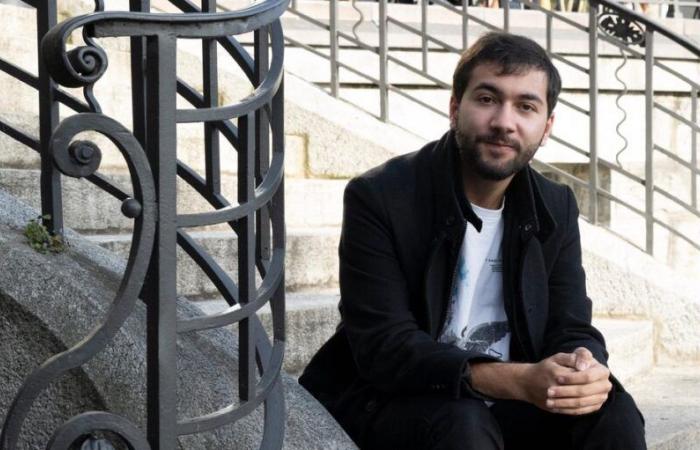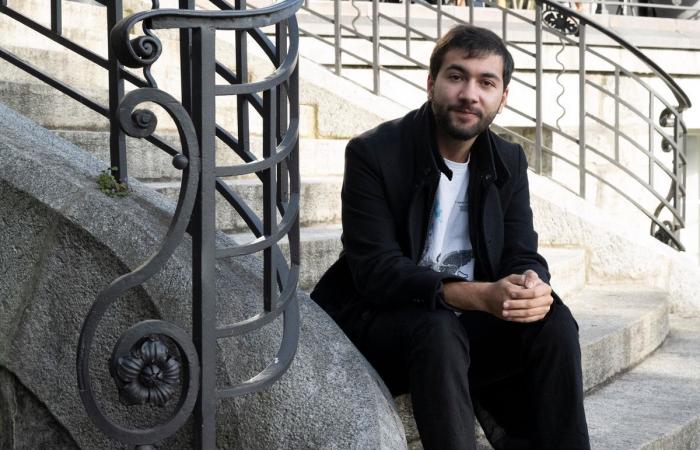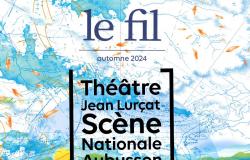Portrait of Théo Rossier –
His Music transforms sounds into stories
Trumpet player, brass band leader, the young composer from Vaud excels at writing powerfully narrative music.
Published today at 9:25 a.m.
The young trumpeter and composer from Vaud Théo Rossier was offered a commission by SOS Méditerranée to write music inspired by the rescues of migrants at sea, created in Caux on November 2 by the Sine Nomine Quartet.
FLORIAN CELLA
Subscribe now and enjoy the audio playback feature.
BotTalk
- Théo Rossier composed “Boat’s Timbres”, inspired by rescues at sea.
- The musical creation will be presented on November 2 in Caux.
- SOS Méditerranée commissioned the work to raise awareness of their humanitarian mission.
- The concert will also include works by Brahms and Schumann.
We hear the cries of seagulls, the disturbing rolling of the waves, the creaking of the ship, the echoes of the radio connections. There’s some frying on the line. And long waiting times. Then suddenly the tension explodes, an alarm sounds, like an echo of “Psychosis” by Bernard Herrmann. The agitation is both chaotic and directed. in an increasingly intense and thrilling sound immersion. No doubt, we are on board the ambulance ship Ocean Viking!
Gleaned in rehearsal, the first impressions of “Boat’s Timbres” demonstrate how Théo Rossier manages, by combining a string quartet and a percussionist, to tell the story of a rescue at sea of a boat in distress by a humanitarian ship. The new work by the Vaudois composer will be premiered this Saturday, November 2 at the Caux Palace as part of a support concert organized by SOS Méditerranée. The Sine Nomine Quartet, percussionist Jens Ruland and pianist Beatrice Berrut are on the bill for a concert which also features works by Brahms and Schumann.
Théo Rossier is not the type to put himself forward. This soft-spoken young man even seems surprised each time by the interest his music arouses. He almost apologizes for having too many ideas going through his head! At the age of 22, alongside his studies in Friborg and Bern and his commitments as a brass band director, his career reveals a great talent for orchestral composition. So much so that “Boat’s Timbres” is one of the smallest staffs he has ever used!
In fact, his “opus 1”, at the age of 14, was a trumpet quartet, composed, performed and premiered during a music camp for wind ensembles. Théo Rossier’s entire childhood was immersed in the world of brass bands and harmony orchestras. His mother plays the flute and his father plays and teaches the trumpet while directing brass bands (he is currently the head of the Geneva Police Band). Laurent Rossier even says that at 3-4 years old, Théo hid under the pool table to listen to the lessons he gave in his room.
Composing is a game
The composition virus, because it is one, also came from this favorable environment. “One of the first things I did on my dad’s computer,” remembers Théo Rossier, “was to have fun on his music software, because he didn’t have a video game. For a long time, I wrote random notes to see what happened. Little by little, I got into the game and started to think about it more seriously. I have preserved this intuitive side in my work, but which means that I have less contact with the paper, the score than others.
In the world of brass ensembles where Théo Rossier evolves, the relationship to creation is completely different from that in symphony orchestras. New compositions are commonplace and, if the pieces are popular, the scores circulate quickly, even internationally. The Vaudois who lived in Valais for a few years has built up a nice corpus of works intended for these amateur groups, but the level is often very high.
His current composition teacher at the HKB in Bern, Oliver Waespi, was part of the selection committee for the European Brass Band Composition Competition and he quickly spotted the piece proposed by the young Vaudois composer – who will win first prize in 2022 in Birmingham. “At the time, I did not yet know Théo and the scores were anonymous,” explains Oliver Waespi, “but I felt that he already had a good knowledge of the medium, thanks to his practice as a conductor, a rich intuition in matters timbre, harmony, atmospheres and great maturity in architecture and in its ability to create an autonomous narrative.”
Telling stories without a word, that’s our composer’s superpower! In this register, an essential milestone occurs in the midst of a pandemic. Deprived of concerts, the OCL has the happy idea of launching a call for projects for young composers, offering the possibility, for the winners, of benefiting from a quality recording. The reading sessions take place behind closed doors on the stage of the Lausanne Opera in 2021 and Théo Rossier presents “The one who whispered in the darkness», a piece with the atmosphere of a suspense film. But which seeks to translate the impression left by the title of the short story of the same name by H. P. Lovecraft.
Sound films
“Rather than illustrating the images of a film, I prefer to create my own visuals using my music alone,” claims the young man. By analyzing my score, conductor Baldur Brönnimann pushed me to move towards more audacity and dissonance. This opportunity was very educational, a godsend for my composition application at the Haute École de Berne.” But this great admirer of Olivier Messiaen and Anton Webern never forgets his connection with the popular world of brass bands. “I like to slalom between these different languages.”
To write “Boat’s Timbres”, Théo Rossier could not base himself on his own experience, having never set foot on a humanitarian boat. He then sought to translate the real sounds of the rescue (which will be broadcast during the evening in order to intensely immerse the audience in the reality at sea) into his own musical language. “I didn’t want to integrate raw sounds into my piece. Through my interpretation, I hope to bring an additional dimension, which requires an effort from the listeners, but which can lead them to another impact on this tragedy. Like a more tenacious inner resonance.
Charity concert in favor of SOS Méditerranée: Caux Palace, Saturday November 2 (from 5 p.m.), tickets from 120 francs, cocktail and train transport from Montreux to Caux and return included, sosmediterranee.ch
Bio
2002 Born in Morges on June 11 into a family of musicians. His first instrument was the cornet. 2014 The family settled in Monthey. Study music at local music school and play trumpet in the Municipal Harmony of Monthey. 2019 Apprenticeship in commercial management at the Music Center in Sion, a musical instrument sales and repair store. 2021 Appointed head of the Fanfare La Vouvryenne. His piece “He Who Whispered in the Darkness” was selected for a reading and recording with the OCL. 2022 First prize in the European Brass Band Composition Competition in Birmingham with the piece “Stendhal’s Syndrome”. Appointed head of the Fanther of Gland. Entry into composition class at HKB. 2023 Creation of “Satyrus” as part of the festival Murten Classics. 2024 Creation of “Boat’s Timbres” with the Sine Nomine Quartet for the SOS Méditerranée association.
Matthew Chenal has been a journalist in the cultural section since 1996. He particularly chronicles the abundant news of classical music in the canton of Vaud and French-speaking Switzerland.More info
Did you find an error? Please report it to us.
0 comments







